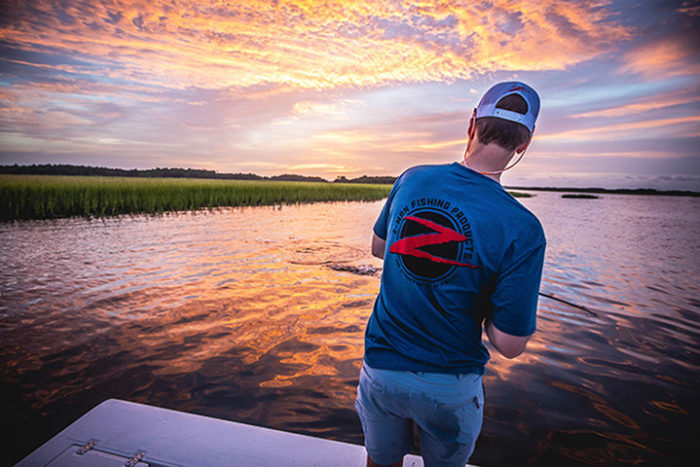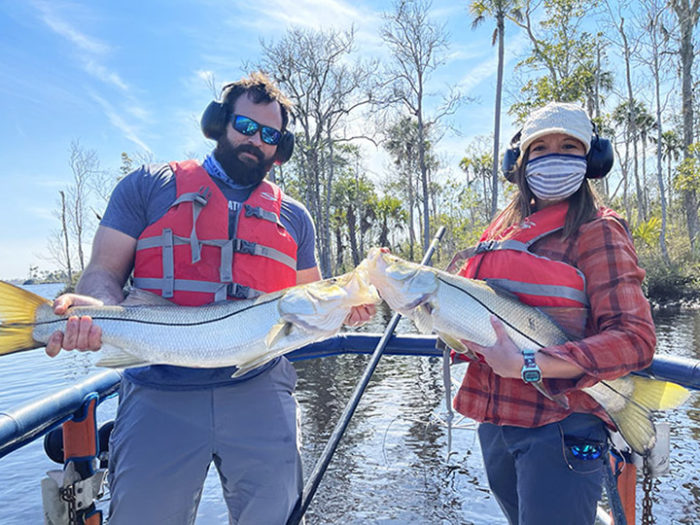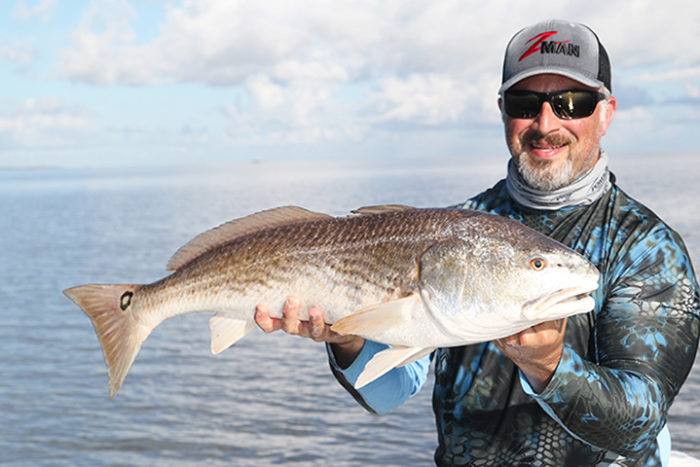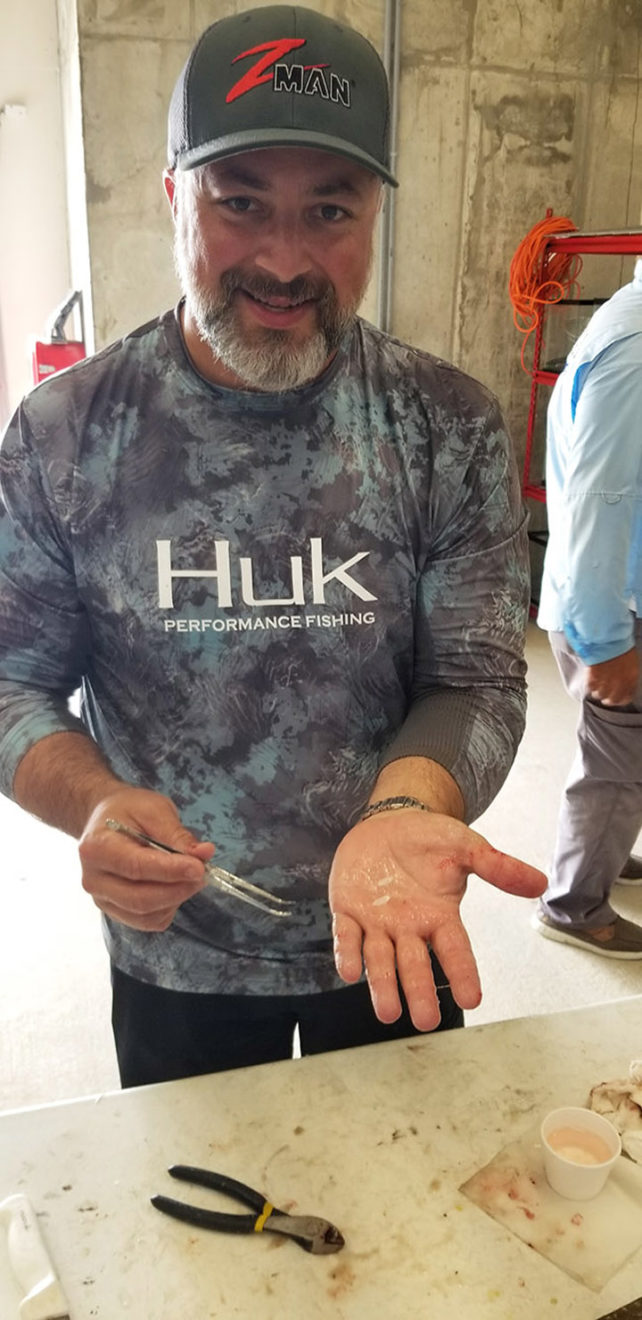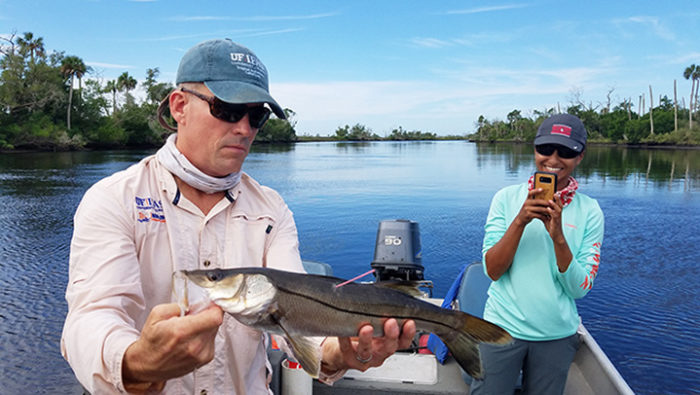Z-Man’s Enduring Commitment to Conservation
March 13, 2021Crafting high-grade baits and tackle is a worthy endeavor only insomuch as the fish and their environs are flourishing. It’s a simple, self-evident idea that’s quietly inhabited the hearts and minds of the people behind Z-Man Fishing Products since day one. It’s also the driving force behind Z-Man’s support of scientists who keep our fisheries humming with aquatic life.
In early 2019, the Charleston, South Carolina based fishing tackle manufacturer assumed a leading role in essential marine research, funding future fisheries biologists via graduate assistantships at the University of Florida’s (UF) Institute of Food and Agricultural Sciences (IFAS) Nature Coast Biological Station in Cedar Key.
“We’ve been friends and supporters of fishery scientists and the vital work they do, pretty much since the beginning of Z-Man,” affirms company president Daniel Nussbaum. “We’re thrilled to support graduate students who are passionate about the long-term sustainability of our fisheries. Preserving key habitat areas such as Florida’s Nature Coast is vital. The current research here is teaching us vital lessons, such as expanding snook populations and their impact on other species.”
Micheal S. Allen, Professor of Fisheries and Aquatic Sciences and Director of the UF/IFAS Nature Coast Biological Station, says this region lies at the epicenter of one of the most unspoiled marine shorelines in North America. “Bordering the Gulf of Mexico, the Nature Coast represents almost one-million-acres of undeveloped land in Florida’s ‘big bend’ region,” explains Allen. “This is a wild, truly special area, largely comprised of forests, prairies and estuaries and nearly free of developed shorelines.
“Typically, we’re doing restorations of negatively impacted ecosystems,” he says. “But the Nature Coast remains relatively pristine, so our work here is all about helping identify management strategies that can preserve and improve a healthy ecosystem that still needs protection.”
With its initial support of IFAS, Z-Man provided paid assistantships for three University of Florida graduate students. The biologists would go on to study oyster reef restoration, the importance of native sea grass for fish and wildlife, and environmental factors affecting seatrout populations. “A lot of our work bears directly on the sportfishing community, and as anglers ourselves, we’re excited about that,” notes Allen.
More recently, IFAS leveraged Z-Man funding to engage two graduate students examining populations of one of Florida’s iconic gamefish. “Over the past decade, in response to rising water temperatures, snook populations have expanded northward along Florida’s Atlantic and Gulf of Mexico coasts,” says Dr. Will Patterson, Professor of Fisheries and Aquatic Sciences at the University of Florida. “The past five years have seen a rapid expansion of snook. This has created increased fishing opportunities in parts of the Nature Coast, but the impact of the population expansion is currently unknown.
“Through the support of Z-Man fellowships, UF funding, and collaborations with the Florida Fish and Wildlife Conservation (FWC) Commission, UF Master’s students Jordan Bajema and Keel Cody are exploring aspects of snook biology along the Nature Coast,” Patterson explains.
To better understand the snook population, Bajema is examining the chemistry of juvenile snook otoliths (ear stones) to develop signatures unique to specific nursery estuaries. “The goal of Mr. Bajema’s work is to determine whether the percentage of locally-produced snook has increased over the past ten years or whether the population expansion relies on movement of adults from further south,” notes Patterson.
Preliminary findings, says Allen, indicate a newly established, locally reproducing snook population around Cedar Key. “Our partnership on research with the Florida FWC and Z-Man has revealed that snook are now spawning in local saltwater estuaries, and the fish aren’t migrating south in winter as we might have expected. Instead, we’re finding that the coastal spring fed river systems are serving as critical winter habitat. Which then ties in to freshwater management and the importance of protecting groundwater discharge and springs.”
Providing further clarity on the snook’s impact on red drum and spotted seatrout, Cody’s research centers on snook diets. “Mr. Cody is analyzing stomach contents of each species, as well as the chemical composition of their muscle tissue to test for overlap in diet and food web position among the different fish,” says Patterson. “A secondary objective of his research is to determine the extent to which snook feed upon red drum or trout.
“Without question, this valuable graduate research will add greatly to our knowledge of the fisheries ecology of snook and its potential impacts on other gamefish along its expanding range.”
“Z-Man’s involvement in these studies has certainly helped make findings like these possible,” adds Allen. “The Z-Man and IFAS partnership—to my knowledge—is truly unique. In twenty-five years of fishery research, it’s the first time I’ve seen a company from the private sector come in and support the work we’re doing and help fund graduate student research— and Z-Man has been with us from the beginning of the UF/IFAS Nature Coast Biological Station.”
A member of the IFAS Board of Directors, Z-Man chairman Jonathan Zucker has eagerly supported fishery research and conservation almost since his family first founded the company thirty years ago— often engaging in hands-on fieldwork himself. “I could tell you the work of fishery professionals is important because healthy fish stocks are critical to our business,” says Zucker. “While this is certainly true, we’re equally invested to help assure our kids and grandkids can enjoy wonderful fishing opportunities for decades to come.
“Our partnership with IFAS and support of other projects is directly tied to our passion for conservation. More than just a cause. It’s fundamental to good fishing and we plan to stay perpetually involved. Actually, caring for aquatic resources is implicit in Z-Man’s mantra, The Science & Art of Fishing.”
For more information about the Z-Man Graduate Research Assistantship program or the UF/IFAS Nature Coast Biological Station visit their website at https://ncbs.ifas.ufl.edu.
Jeremy Mallette is co-founder of International Sportsman. An avid hunter and outdoorsman, he has spent more than a decade in the outdoor industry, from hiking and camping to silencers and hunting. His father taught him to shoot at age six, and he received his first firearm at age eight — a 1942 Colt Commando .38 special revolver. He enjoys yearly trips to Kansas for pheasant hunting, spending time with his children at the deer lease, and collecting unique firearms.

